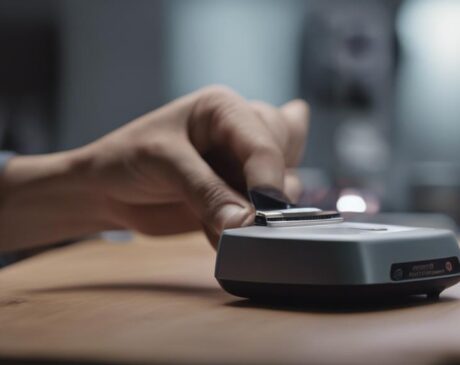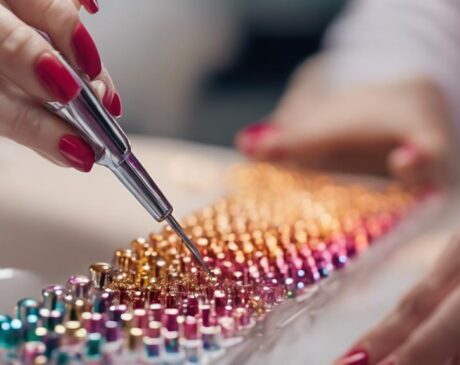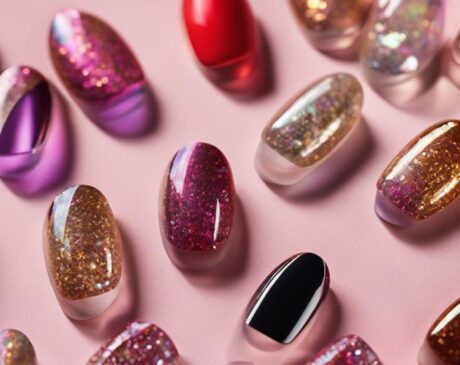Will Hand Sanitizer Ruin Press on Nails?
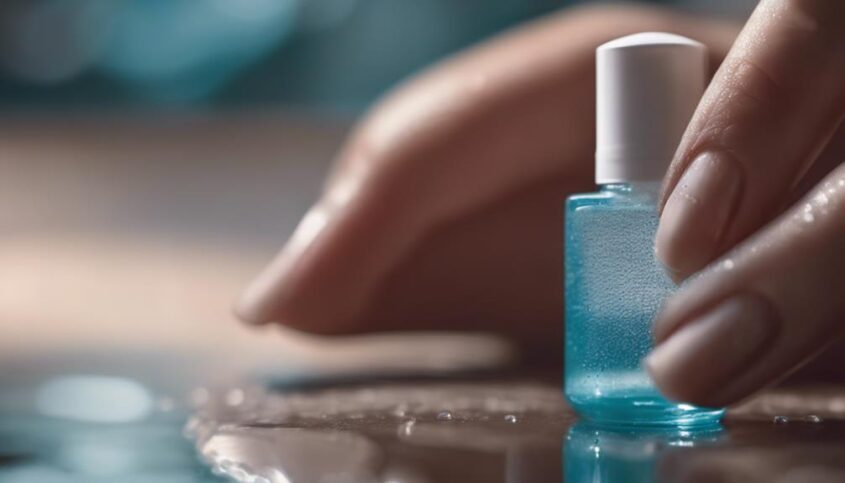
Hand sanitizer can ruin press-on nails due to its high alcohol content and harsh chemicals. These ingredients can affect the appearance and durability of the nails, leading to dryness, brittleness, and weakening of the nail plate. To protect press-on nails, consider using a protective topcoat, avoiding prolonged water exposure, and opting for nail-friendly hand sanitizers with lower alcohol content and moisturizing ingredients. By following best practices for nail care and maintaining good manicure hygiene, you can ensure the longevity and health of your press-on nails. Learn more about nail care and hygiene to enhance your overall manicure experience.
Key Takeaways
- Hand sanitizer can damage press-on nails due to high alcohol content.
- Brittle and weakened nails from sanitizer's harsh chemicals.
- Protect press-on nails with topcoat, gloves, and adhesive reinforcement.
- Choose nail-friendly sanitizers with lower alcohol, moisturizing ingredients, and essential oils.
- Maintain manicure hygiene to preserve press-on nails.
Impact of Hand Sanitizer on Nails
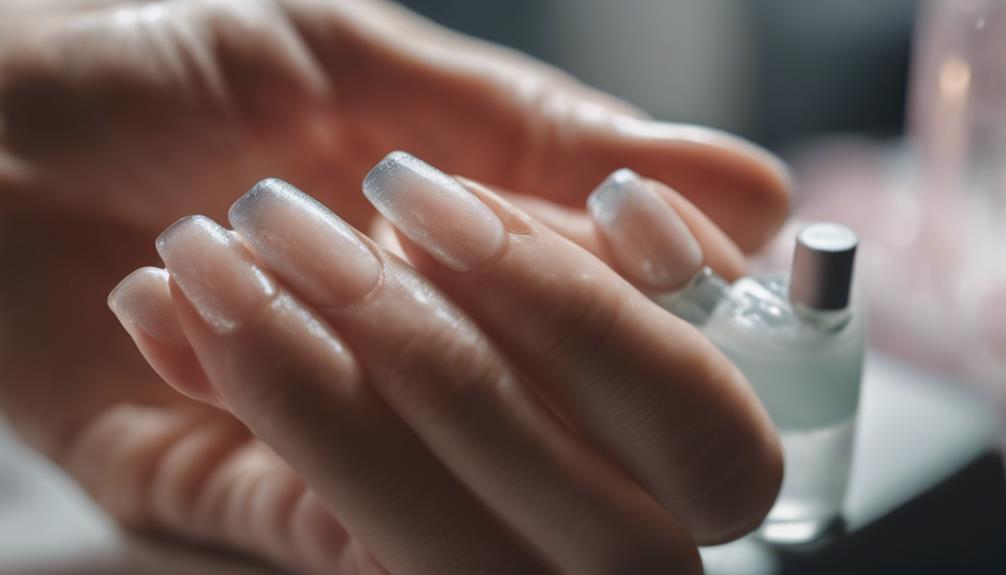
The application of hand sanitizer can potentially have adverse effects on the health and appearance of nails. Hand sanitizers often contain high levels of alcohol, which can lead to dryness and brittleness in nails, making them prone to breakage and damage. The frequent use of hand sanitizer can strip the nails of their natural oils, causing them to become weak and dull.
Additionally, certain ingredients in hand sanitizers, such as harsh chemicals and fragrances, can cause discoloration and weakening of the nail plate over time. This can result in a lackluster and unhealthy appearance of the nails, affecting the overall aesthetic of press-on nails.
To combat these effects, individuals can consider using moisturizing hand sanitizers or applying a nourishing cuticle oil after using regular hand sanitizer. This can help maintain the health and appearance of nails, ensuring that press-on nails remain intact and vibrant. By being mindful of the potential impact of hand sanitizer on nails, individuals can take proactive steps to protect their nail health and preserve the longevity of their press-on nails.
Tips for Protecting Press on Nails
Frequent exposure to hand sanitizer can impact the longevity and appearance of press-on nails, necessitating proactive measures to safeguard their integrity. To ensure your press-on nails stay looking fresh and last longer, consider the following tips:
- Apply a Protective Topcoat: Adding a layer of clear topcoat over your press-on nails can help shield them from the harsh chemicals in hand sanitizers.
- Avoid Submerging in Water: Prolonged exposure to water can weaken the adhesive of press-on nails, making them more susceptible to lifting.
- Use Gloves: When cleaning or performing tasks that involve frequent hand washing, wearing gloves can provide an extra layer of protection for your press-on nails.
- Dry Thoroughly: After washing your hands or coming into contact with water, ensure your nails are completely dry to prevent them from lifting or becoming damaged.
- Reinforce Adhesive: If you notice any lifting or loosening of press-on nails, applying a small amount of nail glue under the edges can help secure them back in place.
Best Practices for Nail Care
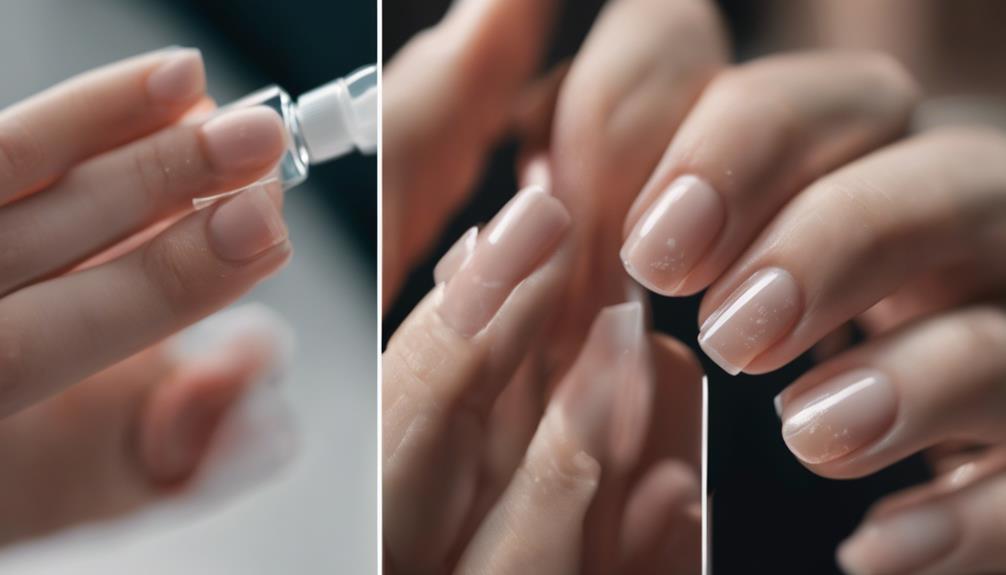
What essential practices should individuals incorporate into their nail care routine to maintain healthy and vibrant nails? Nail care is essential for ensuring strong, beautiful nails. Start by keeping your nails clean and dry to prevent bacteria or fungi from causing infections. Trim nails regularly, filing them in one direction to avoid breakage. Moisturize your cuticles and nails to prevent brittleness and maintain flexibility. Consider using nail strengtheners or protective coatings to enhance nail resilience. Additionally, incorporate a balanced diet rich in vitamins and minerals to promote nail health from the inside out. Avoid using nails as tools to prevent unnecessary stress and damage. When wearing polish, give your nails a break in between to prevent discoloration and allow them to breathe. Lastly, seek professional care for any persistent issues or changes in nail appearance. By following these innovative practices, individuals can achieve and maintain healthy, vibrant nails.
Choosing Nail-Friendly Hand Sanitizers
To maintain optimal nail health while prioritizing hand hygiene, it is important to carefully select hand sanitizers that are gentle and supportive of nail integrity. When choosing nail-friendly hand sanitizers, consider the following:
- Alcohol Content: Opt for hand sanitizers with a lower alcohol content, around 60-70%, to prevent excessive drying of the nails and cuticles.
- Moisturizing Ingredients: Look for sanitizers that contain moisturizing agents like aloe vera or glycerin to keep nails hydrated and healthy.
- Essential Oils: Hand sanitizers infused with essential oils such as tea tree oil or lavender can provide additional benefits for nail health.
- Fragrance-Free Options: Fragrances in hand sanitizers can sometimes cause irritation, so choosing a fragrance-free option can be gentler on nails.
- pH-Balanced Formulas: Opt for hand sanitizers with pH-balanced formulas to avoid disrupting the natural pH of the nails, which can lead to brittleness and breakage.
Maintaining Manicure Hygiene
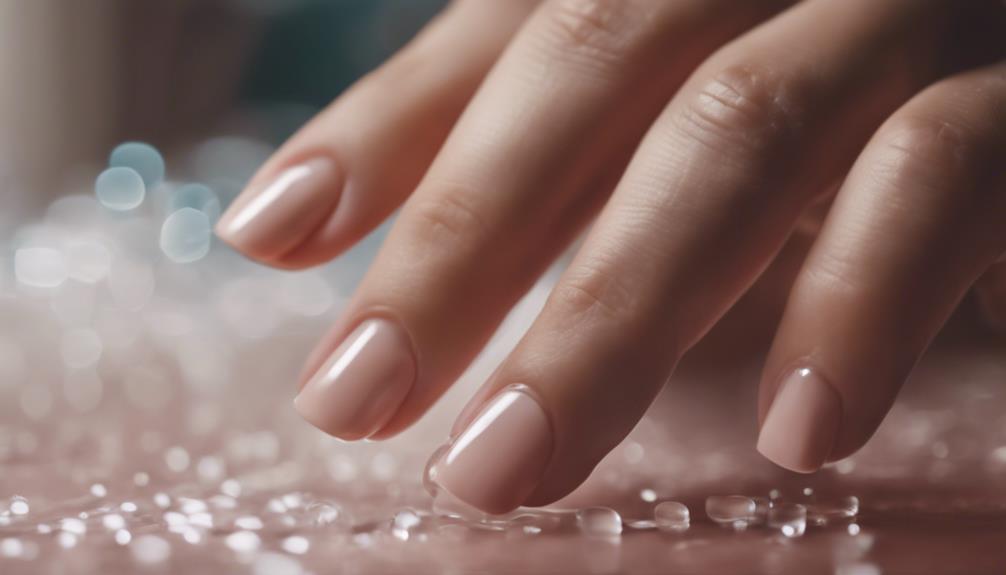
Ensuring proper hygiene practices for your manicure is essential for maintaining the health and appearance of your nails. Innovation in maintaining manicure hygiene involves incorporating advanced techniques and products to uphold cleanliness and prevent infections. One cutting-edge approach is the use of UV sterilization devices specifically designed for nail tools. These devices effectively kill bacteria and viruses, ensuring that your manicure tools remain sanitized between uses.
Additionally, opting for non-toxic and eco-friendly cleaning solutions can help preserve both the environment and your nail health. Look for nail polish removers and sanitizing sprays that are acetone-free and formulated with natural ingredients. These alternatives are gentle on your nails while effectively eliminating germs and bacteria.
Furthermore, practicing good nail care habits such as keeping your nails dry and well-trimmed can significantly reduce the risk of infections. Moisturizing your cuticles regularly and using nail strengtheners can also contribute to maintaining a healthy manicure. By staying informed about innovative hygiene practices, you can ensure that your manicure not only looks fabulous but also promotes the overall well-being of your nails.
Frequently Asked Questions
Can Hand Sanitizer Cause Press on Nails to Lift or Become Loose?
Hand sanitizer, a beacon of cleanliness, can inadvertently weaken the adhesive bond of press-on nails, causing them to lift or become loose. Protect your glamorous fingertips by minimizing direct contact with alcohol-based sanitizers.
Will Hand Sanitizer Affect the Longevity of Press on Nails?
The longevity of press-on nails may be affected by hand sanitizer due to its alcohol content. Frequent use can weaken the adhesive, causing the nails to lift or become loose. Consider minimizing exposure to maintain optimal wear time.
Is It Safe to Use Hand Sanitizer on Press on Nails Immediately After Applying Them?
Using hand sanitizer on press on nails immediately after application is generally safe. However, it's recommended to allow the adhesive to fully set before exposing them to sanitizing agents to ensure optimal adhesion and longevity.
How Often Should I Reapply Hand Sanitizer When Wearing Press on Nails?
Ensuring optimal hand hygiene while maintaining press-on nails' integrity is crucial. To balance both, consider reapplying hand sanitizer as needed, accounting for factors like exposure to germs and the effectiveness of the product used.
Are There Any Specific Ingredients in Hand Sanitizer That May Be Harmful to Press on Nails?
Certain ingredients in hand sanitizers, like acetone and alcohol, can potentially harm press-on nails. These substances have the potential to weaken the adhesive bond, causing premature lifting or damage to the nails. It's advisable to be cautious.

